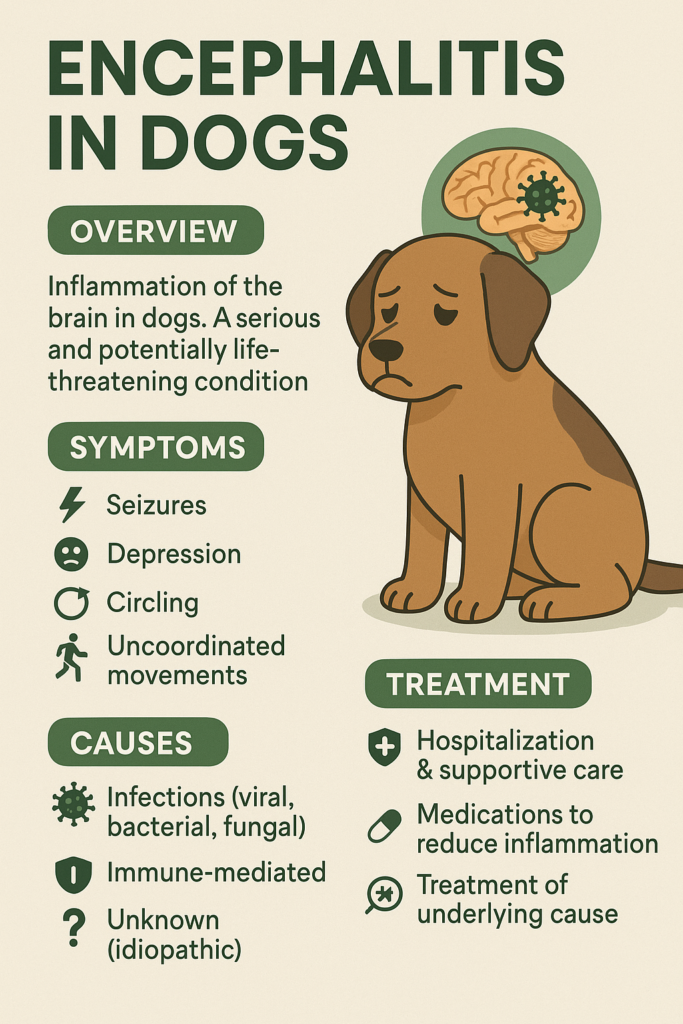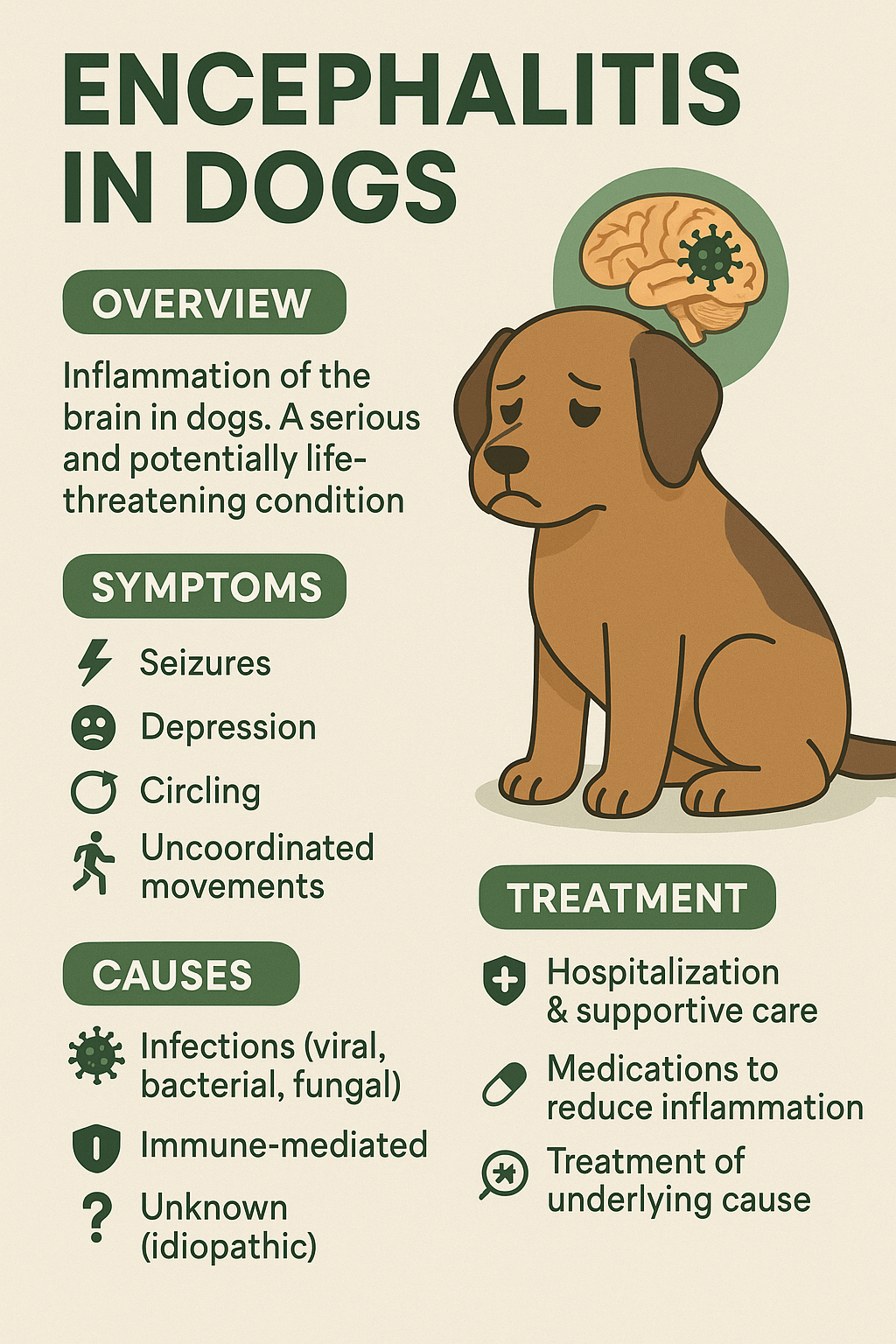Encephalitis in Dogs: Understanding the Condition and Its Impact
Encephalitis in dogs is a serious and often misunderstood condition that affects the brain, leading to inflammation that can have devastating consequences if left untreated. As a responsible pet owner, it’s crucial to recognize the signs, understand the causes, and know how to respond if your furry friend shows symptoms of this neurological disorder. While encephalitis can be challenging to diagnose and treat, early intervention and proper care can significantly improve outcomes for affected dogs. In this blog post, we’ll explore everything you need to know about encephalitis in dogs, from its causes and symptoms to treatment options and prevention strategies.
Expert Insight on Encephalitis in Dogs
“As a veterinarian, I occasionally encounter cases of encephalitis in dogs—a condition that can significantly impact a dog’s health. Understanding this disorder is crucial for early detection and effective treatment. This comprehensive guide aims to educate pet owners on the causes, symptoms, and treatment options for encephalitis in dogs.”
What Causes Encephalitis in Dogs?
The exact cause of encephalitis in dogs can vary, but understanding the potential triggers is essential for prevention and early detection. Here are some common factors that contribute to this condition:
Infectious Agents:
Bacteria, viruses, fungi, and parasites can invade the brain, causing inflammation. Tick-borne diseases like Lyme disease are frequent culprits.Autoimmune Disorders:
In some cases, the dog’s immune system mistakenly attacks its own brain tissue, leading to inflammation. This is known as immune-mediated encephalitis.Genetic Predisposition:
Certain breeds, such as Pugs and Yorkshire Terriers, are more prone to encephalitis due to genetic factors.Environmental Toxins:
Exposure to harmful chemicals or toxins can trigger an inflammatory response in the brain.Trauma or Injury:
Head injuries or other forms of trauma may result in secondary encephalitis due to swelling or infection.
By identifying these potential causes, veterinarians can better tailor diagnostic tests and treatment plans to address the underlying issue.

Recognizing the Symptoms of Encephalitis in Dogs
Early recognition of encephalitis symptoms is critical for ensuring timely veterinary care. Keep an eye out for these warning signs that may indicate your dog is suffering from this condition.
Seizures:
Sudden, unexplained seizures are one of the most common symptoms of encephalitis and should never be ignored.Behavioral Changes:
Dogs with encephalitis may exhibit unusual aggression, confusion, or lethargy, signaling neurological distress.Loss of Coordination:
Difficulty walking, stumbling, or appearing disoriented could point to brain inflammation affecting motor skills.Head Pressing:
Some dogs press their heads against walls or furniture, a sign of neurological discomfort or pain.Vision Problems:
Blurred vision or blindness may occur if the inflammation impacts areas of the brain responsible for sight.
If you notice any combination of these symptoms, seek veterinary attention immediately to rule out or confirm encephalitis.
Check this guide 👉Dog Brain Tumor Symptoms: Best 7 Expert Tips!
Check this guide 👉Dog Brain vs Human Brain: Best 7 Expert Tips!
Check this guide 👉How Big Is a Dogs Brain? Best 7 Expert Tips!
Causes of Encephalitis | Common Symptoms to Watch For |
|---|---|
Infectious agents (bacteria, viruses) | Seizures |
Autoimmune disorders | Behavioral changes |
Genetic predisposition | Loss of coordination |
Environmental toxins | Head pressing |
Trauma or injury | Vision problems |
Treatment Options for Encephalitis in Dogs
While encephalitis can be a life-threatening condition, there are several treatment options available to manage symptoms and improve your dog’s quality of life. Here’s what you need to know:
Anti-Inflammatory Medications:
Corticosteroids like prednisone are often prescribed to reduce brain inflammation quickly.Immunosuppressive Therapy:
For autoimmune encephalitis, medications that suppress the immune system may be necessary to prevent further damage.Antibiotics or Antivirals:
If an infection is the cause, targeted treatments such as antibiotics or antiviral drugs will be administered.Supportive Care:
Intravenous fluids, nutritional support, and hospitalization may be required to stabilize severely affected dogs.Monitoring and Follow-Up:
Regular check-ups and imaging tests, such as MRIs, help track progress and adjust treatment plans as needed.
With prompt and appropriate care, many dogs with encephalitis can recover or live comfortably despite the condition.
Preventing Encephalitis in Dogs
While not all cases of encephalitis can be prevented, taking proactive steps can significantly reduce your dog’s risk of developing this condition.
Vaccinations:
Keeping your dog up-to-date on vaccinations protects them from infectious diseases that could lead to encephalitis.Tick Prevention:
Use flea and tick preventatives year-round to minimize the risk of tick-borne illnesses.Healthy Diet and Lifestyle:
A balanced diet and regular exercise boost your dog’s immune system, making them less susceptible to infections.Regular Vet Check-Ups:
Routine veterinary visits allow for early detection of underlying health issues that could contribute to encephalitis.Avoiding Toxins:
Keep your home free of harmful substances, such as cleaning chemicals or pesticides, that could harm your dog’s nervous system.
By prioritizing prevention, you can safeguard your dog’s health and well-being while reducing the likelihood of encephalitis.
Types of Encephalitis in Dogs
Encephalitis in dogs can manifest in different forms, each with unique characteristics. Understanding these types helps veterinarians determine the best course of action.
Infectious Encephalitis:
Caused by pathogens like bacteria, viruses, or fungi, this type requires targeted antimicrobial treatment.Steroid-Responsive Meningoencephalitis (SRMA):
Common in young dogs, SRMA responds well to corticosteroid therapy.Granulomatous Meningoencephalitis (GME):
A severe form of encephalitis characterized by granulomas in the brain tissue.Necrotizing Encephalitis:
Often seen in small breeds, this type involves brain tissue death and is typically progressive.Idiopathic Encephalitis:
When no clear cause is identified, the condition is labeled idiopathic, requiring broad-spectrum treatment.
Each type presents unique challenges, underscoring the importance of accurate diagnosis and tailored care.
Supporting Your Dog During Recovery
Caring for a dog recovering from encephalitis requires patience and dedication. These tips can help you provide the best possible support during their healing journey.
Create a Calm Environment:
Minimize stress by keeping your home quiet and free of disturbances.Monitor for Side Effects:
Watch for adverse reactions to medications, such as increased thirst or appetite changes.Encourage Gentle Activity:
Short, supervised walks can aid recovery without overexertion.Maintain a Consistent Routine:
Stick to a predictable schedule for feeding, medication, and rest to promote stability.Seek Emotional Support:
Caring for a sick dog can be emotionally taxing; don’t hesitate to lean on friends, family, or support groups.
Your efforts during recovery can make a significant difference in your dog’s overall well-being.
Debunking Myths About Encephalitis in Dogs
Misinformation about encephalitis can lead to unnecessary fear or confusion. Let’s clear up some common myths surrounding this condition.
Myth: Encephalitis Only Affects Older Dogs:
While older dogs may face higher risks, younger dogs are also susceptible, especially to certain types like SRMA.Myth: All Cases Are Fatal:
Many dogs recover fully or live comfortably with ongoing treatment and care.Myth: Vaccines Cause Encephalitis:
There is no scientific evidence linking routine vaccines to encephalitis in dogs.Myth: It’s Always Painful for the Dog:
While some symptoms are uncomfortable, pain management ensures your dog remains as comfortable as possible.Myth: You Can Treat Encephalitis at Home:
Professional veterinary care is essential for proper diagnosis and treatment.
Dispelling these myths helps pet owners approach encephalitis with clarity and confidence.
Frequently Asked Questions About Encephalitis in Dogs
Can encephalitis in dogs be cured?
While some cases can be managed effectively, others may require lifelong treatment depending on the underlying cause.
Is encephalitis contagious to other pets?
Most forms of encephalitis are not contagious, but infectious causes like viruses or bacteria may pose risks to other animals.
How long does treatment take?
Treatment duration varies based on the severity of the condition and the dog’s response to therapy.
Are certain breeds more at risk?
Yes, small breeds like Pugs and Yorkshire Terriers are genetically predisposed to specific types of encephalitis.
What should I do if my dog has a seizure?
Stay calm, ensure your dog is safe from injury, and contact your veterinarian immediately for guidance.
Empowering Pet Owners to Face Encephalitis
Encephalitis in dogs is a complex and challenging condition, but with knowledge, vigilance, and timely veterinary care, it doesn’t have to be a hopeless diagnosis. By understanding the causes, recognizing the symptoms, and exploring treatment options, you can give your dog the best chance at recovery. Remember, prevention plays a vital role in protecting your pet’s health, so prioritize regular vet visits, proper nutrition, and a safe environment. With love, care, and dedication, you can navigate the challenges of encephalitis and continue to cherish every moment with your beloved companion.
Do Cats Have Taste Buds? Best 7 Expert Tips! – Discover how cats experience flavors and why their taste is so unique.
Do Dogs Have Taste Buds? Best 7 Expert Tips! – Discover how dogs experience taste, their preferences, and what it means for their diet and health.
Can Cats Taste Sweet? Best 7 Expert Tips! – Discover why cats can’t taste sweetness, how it affects their diet, and tips to keep them healthy and happy.
Can Dogs Taste Sweet? Best 7 Expert Tips! – Discover how dogs perceive sweetness, which foods are safe, and tips to manage their sweet cravings responsibly.





